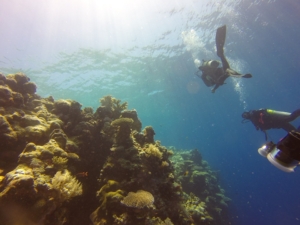Do you log your dives? If not, you should. Whether you’re preparing for your first open-water dive, or if you’re an experienced diver with over 100 dives under your belt, logging your dives is important for several reasons. By taking the time to complete a dive log after each dive, you’ll become a better diver. Here are five important reasons why every diver, regardless of skill or experience, should log their dives.
#1) Better Prepare for Future Dives
Logging your dives allows you to better prepare for future dives. When you log your dives, you’ll know exactly what to expect when diving in similar environments. If the water was particularly cold, for example, you can include this information in your dive log. The next time you do diving at a similar location around the same time of year, you’ll know to wear a thicker and more insulative wetsuit — or to dive at a shallower depth — to protect against the cold water.
Dive logs can help you choose the right weight for future dives as well. In the equipment section, you can make a note of how much weight you added to your weight belt. If you used 4 pounds but struggled to maintain neutral buoyancy, you’ll know that 4 pounds is insufficient when diving in similar environments. As a result, you can add more weight to your weight belt. These are just a few ways that logging your dives can help you prepare for future dives.

#2) Track of Equipment Maintenance and Repairs
Another reason to log your dives is so that you can track equipment maintenance and repairs. Maybe your face mask is leaking, or perhaps your gas tank is rusting. If you don’t log your dives, you may forget to fix your leaking face mask or repair your rusted gas tank. Equipment problems such as these can cause serious headache, but they are typically avoidable by logging your dives.
As a diver, it’s your responsibility to stay on top of all necessary equipment maintenance and repairs. Diving with faulty equipment is a serious mistake that will place you at a greater risk for injury. Something as otherwise simple as a leaky face mask can cause water to enter your nose and, therefore, make it difficult to breathe.
Even if you’re only performing a short 15-minute dive right off the coast, you should complete a dive log. In the dive log, don’t just list the equipment used during the dive but also make a note of any maintenance or repairs your equipment needs. Assuming you review your dive logs on a regular basis (which you should), you’ll have an easier time keeping your equipment in tiptop shape. If a dive log from a recent dive contains a note about a problematic piece of equipment, you’ll know to repair or replace the equipment before your next dive.
#3) Stay Safe When Diving
Using dive logs will help keep you safe when diving. While the primary sections of a dive log include the header, profile, equipment, conditions, comments and verification, many dive log books include a section for emergency medical information. By completing this section, you can rest assured knowing that doctors and other medical professionals can provide you with the best possible treatment in the event that you are injured.
As the saying goes, “Hope for the best but prepare for the worst” rings true when diving. Hopefully, you’ll have a safe and pleasant diving experience, but you should still prepare for the worst by completing the emergency medical information section in your dive log book. Using the information provided here, you’ll receive the best possible medical care if you are injured while diving.
The dive log books sold here at DiveLogz feature a “Diver Information” page. On this page, you can include the following information:
- Name
- Address
- Phone number
- Email address
- Emergency contact name
- Emergency contact address
- Emergency contact phone number
- Relationship of emergency contact
- Blood type
- Allergies
- Current medications
- Medical insurance provider
- Medical insurance policy number
- Medical insurance phone number
- Additional information (you can include any other important or meaningful medical information here)
#4) Creates a Journal of Your Diving Experiences
By logging your dives, you’ll create a written journal of your diving experiences. As you may know, no two dives are the same. You’ll encounter different marine life, underwater structures and water conditions with each dive. Rather than trying to remember the details of each dive, you can write about them in dive logs.
It’s nearly impossible to remember every little detail about a dive. Granted, you may remember when and where you dive, but chances are you’ll forget the smaller details like the specific types of fish and coral. And if you don’t remember the details, these memories will be lost forever — unless you log your dives. In the conditions section, you can write about the water and visibility conditions. In the comments section, you can write about the fish and other marine life that you encountered.
You can even include notes about the people you meet in your dive logs. Diving is a social activity that brings together like-minded people. Unless you’re performing a solo dive, you’ll probably be paired up with at least one other diver. Therefore, you’ll meet new people and make new friends when diving. In your dive logs, you can make a note of any new faces that you encountered during your dive trip. Don’t let your diving experiences escape your memory. Keep a written journal of them by logging all your dives.
#5) Obtain Diving Certifications
If you’re trying to obtain a diving certification, you’ll need to log your dives. All of the major diving organizations, including the Professional Association of Diving Instructors (PADI) and National Association of Underwater Instructors (NAUI), require divers to have a minimum number of logged dives to enroll in some of their certification courses. The PADI Master Scuba Diver course, for example, requires a minimum of 50 logged dives, whereas the PADI Advanced Rebreather Diver course requires a minimum of 30 logged dives.
Why do diving organizations require a minimum number of logged dives for courses such as these? Well, some certification courses aren’t intended for new or inexperienced divers. Rather, they are intended for intermediate or advanced divers. To ensure that only experienced divers enroll in the course, diving organizations only accept students with a minimum number of logged dives.
In the verification section of a dive log, the divemaster can sign his or her name to verify that you actually completed the dive. Alternatively, some divemasters use a stamp to verify dive logs. Whether your dive log is signed or stamped by the divemaster, this shows that you completed the dive. If you want to enroll in an intermediate- or advanced-level diving certification course, you may be required to show a minimum number of logged and verified dives.
As you can see, logging your dives is important for many reasons. It helps you prepare for future dives, allows you to keep track of equipment maintenance and repairs, encourages safe diving, creates a journal of your experiences, and it can even help you obtain diving certifications. For these reasons and others, you should complete a dive log every time you go diving.
Grab your diving log book here.



